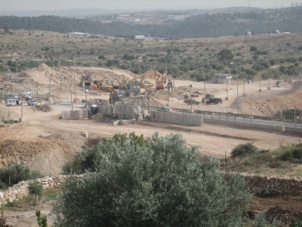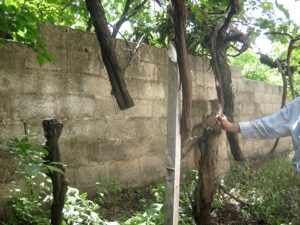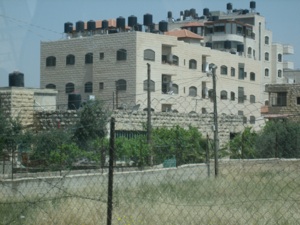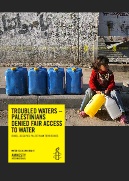Water, Roads
and the Land

Water, Roads
and the Land

An astonishing 60% of West Bank agricultural land has been re-zoned by the Israelis for settlers and industry. Without of course either consulting the Palestinians and or paying for it, this land has simply been taken and built upon: 86% of the settlements are built on private Palestinian land.
Further, in the West Bank over 20 ‘Jews only’ roads, forming the main road grid, have been built for settler-exclusive use; so that for example Ma’ale Adumin is a convenient 15 minutes commute from Jerusalem. These roads cut up the West Bank, making travel for Palestinians near impossible. Palestinians are forced to use minor roads and mountain tracks, unsuited to commercial vehicles and frequently dangerous in winter. Meanwhile the settlers have a road system into which $3 billion of US ‘aid’ has been poured.
Given the blockades and barriers, Palestinians are cut off from land which they have farmed for hundreds of years. It is reckoned that a hundred villages are so cut off. Further, it has become impossible for farmers to reach the towns which, for generations, have been supplied by the surrounding countryside. It would be necessary to make a major detour on the minor, frequently unsafe, roads. In the case of Jerusalem, they West bank farmers have no pass to go there. When farmers are cut off from their land the fruit is left to rot on the trees, whereupon the land is declared to be ‘fallow’. Following an old Ottoman law, whereby if farm land is not kept up for three years it is considered ‘abandoned’, the Fallow Land Regulations of 1948 made it possible for the Israeli government to confiscate Arab land that was judged uncultivated (another of the Kafkaesque situations with which Palestinian existence is riddled). I have heard of Palestinians needing permits even to grow a few vegetables alongside their houses! Effluence from settlements may be deliberately allowed to flow onto Palestinian land, thus poisoning the crops. When agricultural land is taken, or becomes unusable, those who were farmers become unemployed.
In the 2008-09 Gaza offensive 17% of farmland was wrecked and a further 30% left unusable.
Israel has further uprooted or cut down large numbers of ancient olive trees; a million fruit and olive trees in total. The uprooted trees are sold to Israelis, or abroad, or roads will be decorated with uprooted and stolen Palestinian olive trees. Cartoons drawn by Palestinians on their side of the wall depict stumps of sawn-off trees.
Given the climate, a major issue is that of water. An incredible 80% of the available water on the occupied West Bank is diverted to Israel and its settlements. Israeli settlements are built over the major aquifers. Thus Palestinians are reduced to buying their water from Israel – while the settlers in the West Bank enjoy their swimming pools. One drives into a settlement to find a fountain in the middle of a roundabout. The water consumption of the 5,000 settlers in the Jordan valley is equivalent to 75% of that of the two million Palestinian inhabitants of the West Bank.
Moreover the Israeli Civil Administration (the Israeli military in the West Bank) will deliberately destroy Palestinian water supplies. From an e-mail from ICAHD (10 June 09) I learned of a (typical) action taken against the farmers of the Beqaa Valley near Hebron: ‘In total, the Israeli military destroyed six cisterns, hauled away many feet of irrigation pipes from Palestinian fields and took down an electricity pylon and power pole.’ In 2010 Sky News showed footage of a small boy clinging to his father who was being arrested for ‘stealing’ water from an (illegal) settlement when they had documents to prove they were registered with the Palestinian Water Authority (again near Hebron).
Palestinians routinely have water for a few hours a week in summer: one can readily identify which dwellings are Palestinian from the water storage tanks on their roofs. Otherwise they collect rainwater. In any two-state agreement it will be absolutely vital that the Palestinians have control over their own infra-structure and water.


The building of the wall at Ni’lin takes away their agricultural land and their livelihood
A Palestinian shows vines cut by the settlers living above him; it has begun to grow again, in which he finds a moral!
Palestinian housing in East Jerusalem with water tanks
Specialist Literature:
Water:
-Jews for Justice for Palestinians ‘Support Israeli NGOs campaign for Palestinian water rights’.

Amnesty International ‘Troubled Waters: Palestinians Denied Fair Access to Water’.
The Land:
-Truth Out, ‘Living by the Gate from Hell: A Portrait of Nonviolent Resistance in One Palestinian Village’.
-Robert Fisk, ‘In the West Bank’s Stony Hills Palestine is Slowly Dying’. (The Independent, 30.01.2010 )
Podcasts: Water:
- Amnesty International ‘Troubled Waters’ and another ‘Troubled Waters’ video here.
See Further on this Site: